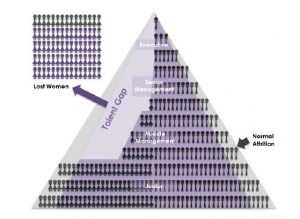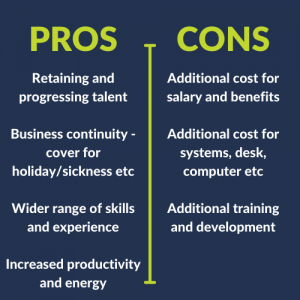These are challenging times in the business world, so it is more important than ever to continue attracting and retaining the best possible talent that will allow your business to compete and grow.
The recruitment, retention, and progression of senior women are imperative to ensuring a business not only survives but thrives in this new world of work. At Career Voyage, we recognise that for some, working full-time is not an option or makes life much more complex and without an alternative solution, businesses can lose their best talent.
So, what is the solution?
Well, the ability to work part-time can often make a world of difference; however, many senior-level positions require full-time attention, so one answer to this conundrum is job shares. Most employers understand what a job share is as flexible working becomes the norm; however, just to be sure, a job share is not two people working part-time jobs in parallel – that’s part-time working. Instead, job sharing is two people, through shared responsibilities, identities and accountability, occupying one position. They are a single unit, a team and a and a complete resourcing solution. With job sharing, employees get the flexibility they crave, and employers have the complete resourcing solution they require to get the job done.
In 2007, a report by the Working Families emphasised the benefits of utilising job shares. For businesses, it meant greater diversity, enhanced productivity, improvements in processes and more significant innovation. However, job shares are still one of the most underutilised forms of flexible working.
The current world of business
As businesses fight to compete globally, there is more and more pressure to be available and responsive 24/7. This results in added pressure on employees to work longer hours and can often result in burnout or employees leaving the business altogether. Furthermore, the 2011 Davies report on (the lack of) Women on Boards demonstrated that companies are losing high performing female staff at an alarming rate.

Credit: Your Loss: How to Win Back your Female Talent, 2010 Christina Ioannidis and Nicola Walther, 2010
It’s suggested that in part, this is due to a lack of flexible working opportunities at senior levels; however, it’s crucial to make it clear that job shares are not just for working mums or women in general; there are benefits for both male and female employees for a variety of reasons.
What are the pros and cons of job shares?
How to make job shares work at a senior level?
- Job share partners do not have to know each other or have worked together before to be successful, but they have to have the same values and work ethic and it’s all about TRUST
- Job design is essential to ensure that responsibilities and deliverables are clearly communicated to both partners. COMMUNICATION is key.
- Job share partners do not have to be a perfect match; often, partners will be more productive if their skills and personality traits bring different things to the table.
- Job sharing does not mean an employee wants to slow down their career. Those that take up job share positions are often high performers who will go the extra mile to ensure the job share is a success and get promoted together.
- If the job share doesn’t work out, and if someone quits, you still have an incumbent doing some of the role, so you only have half a vacancy.
- Do you have a shared email address sarahandemma@careervoyage.co.uk or seperate ones and which project management, CRM and office tools should you use. You need to plan.
- Job sharing does not suit everyone. Be clear about expectations and the type of person you are looking for and ensure recruitment processes are robust to identify those who are or are not suitable.
More information
If you would like support implementing job shares, or other flexible working practices, into your business, please contact us at sarah@careervoyage.co.uk
.Follow us on social media

Sarah started her career in fmcg marketing working as a brand manager on Clover and as an interim manager on Clover (twice) and Quorn. She founded a start-up interim management company in Gloucestershire and that business changed the percentage of women and diverse talent in senior marketing and HR roles. Sarah specialises in attracting, onboarding, developing, engaging and retaining diverse talent into forward thinking businesses to improve productivity, performance and profit. Flexible working and wellbeing play a large part. Since covid-19 wreaked havoc on the job landscape, Sarah has a created an innovative programme to get senior experienced professionals back into work or fine-tune their current role so that it makes happy.


